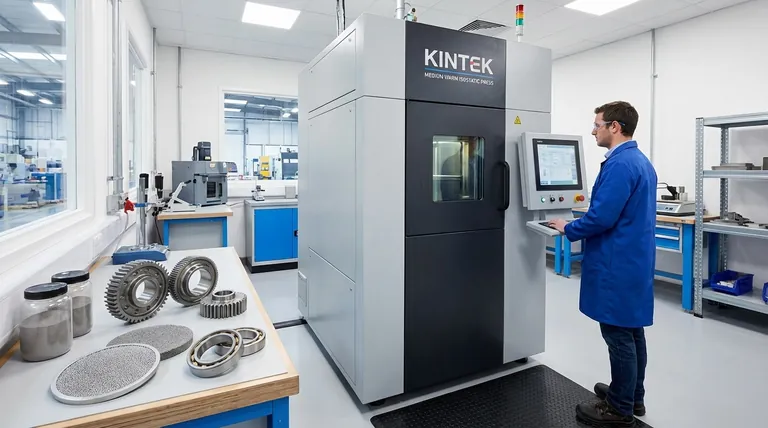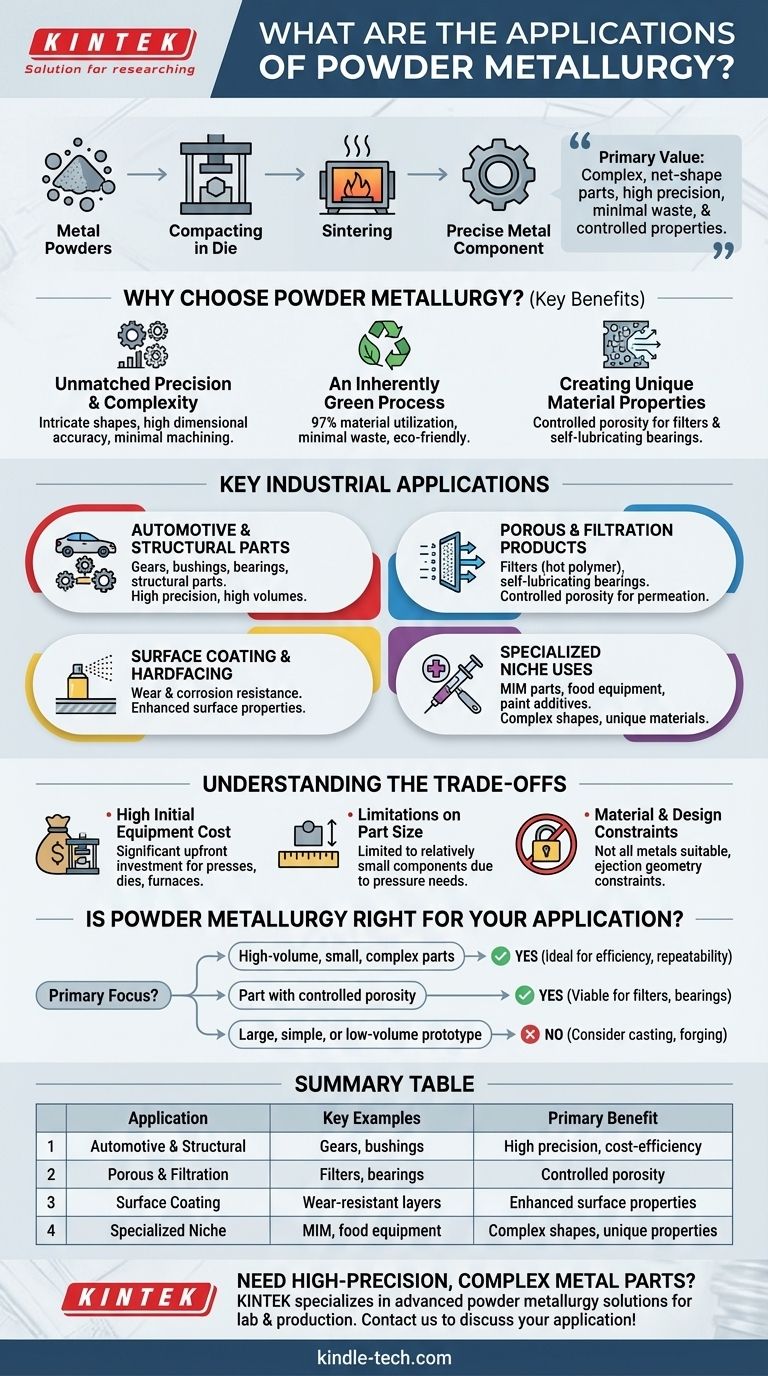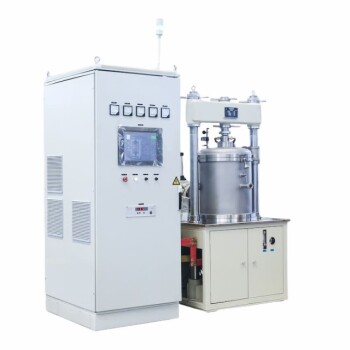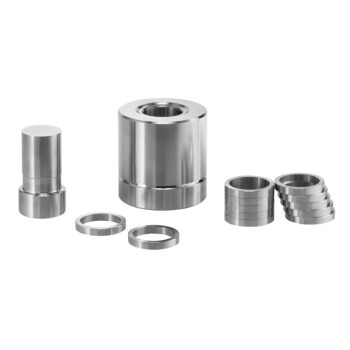At its core, powder metallurgy is a highly versatile manufacturing process used to create precise metal components from powdered materials. Its applications range from critical automotive and aerospace parts like gears and bearings to specialized products such as industrial filters, surface coatings, and even additives for paint. The process involves compacting metal powders in a die and then heating, or "sintering," them to bond the particles into a solid, high-tolerance part.
Powder metallurgy's primary value is not just as an alternative to casting or forging, but as a unique solution for creating complex, net-shape parts with high precision, minimal waste, and controlled material properties that are often impossible to achieve with other methods.

Why Choose Powder Metallurgy?
Powder metallurgy (PM) is selected when the final part's specific characteristics and the manufacturing process's efficiency are paramount. Its foundational principles explain its widespread adoption in demanding industries.
Unmatched Precision and Complexity
The PM process uses a rigid die to press powdered metals under extreme pressure. This allows for the creation of intricate shapes and homogenous, uniform parts with exceptional dimensional accuracy right out of the mold, minimizing the need for secondary machining.
An Inherently 'Green' Process
PM is a remarkably efficient and eco-friendly manufacturing method. Approximately 97% of the raw material used becomes part of the final product. This results in very little scrap or waste, making it both cost-effective and environmentally sustainable compared to subtractive methods like machining.
Creating Unique Material Properties
Unlike melting and casting, PM allows for the creation of materials with controlled porosity. This is fundamental for producing components like self-lubricating bearings or filters, where the ability for a gas or liquid to permeate the material is a design requirement.
Key Industrial Applications
The unique advantages of powder metallurgy make it the go-to process for a wide variety of parts and products across several key industries.
Automotive and Structural Parts
The automotive industry is one of the largest consumers of PM parts. The process is essential for producing high volumes of complex components like gears, bushings, bearings, and other structural parts where tight tolerances and consistent performance are critical.
Porous and Filtration Products
PM is uniquely suited to produce porous products. This capability is leveraged to create filters for applications like hot polymer filtration, where fluids must pass through a durable metal medium. It is also used to make self-lubricating bearings, which are impregnated with oil that is released during operation.
Surface Coating and Hardfacing
Metal powders are often used in surface coating and hardfacing applications. In this process, a layer of specialized powder is applied and bonded to a base material to significantly enhance its wear resistance, corrosion resistance, or other surface properties.
Specialized Niche Uses
The flexibility of PM extends to more specialized fields. It is a cornerstone of Metal Injection Molding (MIM), an advanced form of PM for creating highly complex, small parts. Powders are also used as paint additives to provide metallic finishes and in manufacturing durable, sanitary food equipment.
Understanding the Trade-offs
While powerful, powder metallurgy is not a universal solution. Understanding its limitations is key to making an informed decision.
High Initial Equipment Cost
The PM process requires specialized and expensive equipment. Compacting presses, custom dies, and high-temperature sintering furnaces represent a significant upfront investment, making it most suitable for high-volume production runs where the cost can be amortized.
Limitations on Part Size
The immense pressure required to compact the powder generally limits the size of components that can be produced. PM is typically used for relatively small parts, as creating very large components would require prohibitively large and powerful presses.
Material and Design Constraints
While versatile, not all metals can be easily formed into a powder suitable for the PM process. Furthermore, certain part geometries can be difficult to eject from the die after compaction, which places some constraints on component design.
Is Powder Metallurgy Right for Your Application?
Choosing the right manufacturing process depends entirely on your specific goals for cost, volume, and final part characteristics.
- If your primary focus is high-volume production of small, complex parts: Powder metallurgy is an ideal choice due to its high efficiency, excellent repeatability, and minimal material waste.
- If your primary focus is creating a part with controlled porosity: Powder metallurgy is one of the only viable and cost-effective methods for applications like filters or self-lubricating bearings.
- If your primary focus is a large, simple component or a low-volume prototype: Traditional casting, forging, or machining will almost certainly be a more practical and economical approach.
Ultimately, powder metallurgy excels where precision, material efficiency, and unique material properties are non-negotiable requirements.
Summary Table:
| Application | Key Examples | Primary Benefit |
|---|---|---|
| Automotive & Structural Parts | Gears, bushings, bearings | High precision, cost-efficiency for high volumes |
| Porous & Filtration Products | Filters, self-lubricating bearings | Controlled porosity for fluid/gas permeation |
| Surface Coating & Hardfacing | Wear-resistant coatings | Enhanced surface properties |
| Specialized Niche Uses | MIM parts, food equipment, paint additives | Complex shapes, unique material properties |
Need high-precision, complex metal parts for your lab or production line? KINTEK specializes in advanced powder metallurgy solutions, providing the lab equipment and consumables you need to create durable, net-shape components with minimal waste. Whether you're developing filters, specialized coatings, or intricate gears, our expertise ensures superior results. Contact our team today to discuss how we can support your specific application!
Visual Guide

Related Products
- Warm Isostatic Press WIP Workstation 300Mpa for High Pressure Applications
- Warm Isostatic Press for Solid State Battery Research
- Manual High Temperature Heated Hydraulic Press Machine with Heated Plates for Lab
- Automatic High Temperature Heated Hydraulic Press Machine with Heated Plates for Lab
- 24T 30T 60T Heated Hydraulic Press Machine with Heated Plates for Laboratory Hot Press
People Also Ask
- What are some of the attractive properties of hot isostatic pressed products? Achieve Perfect Density and Superior Performance
- What are the components of a hot isostatic pressing system? A Guide to Core HIP Equipment
- Is hot isostatic pressing a heat treatment? A Guide to Its Unique Thermomechanical Process
- What is HIP in material processing? Achieve Near-Perfect Density for Critical Components
- What is HIP treatment for metal? Eliminate Internal Defects for Superior Part Performance



















